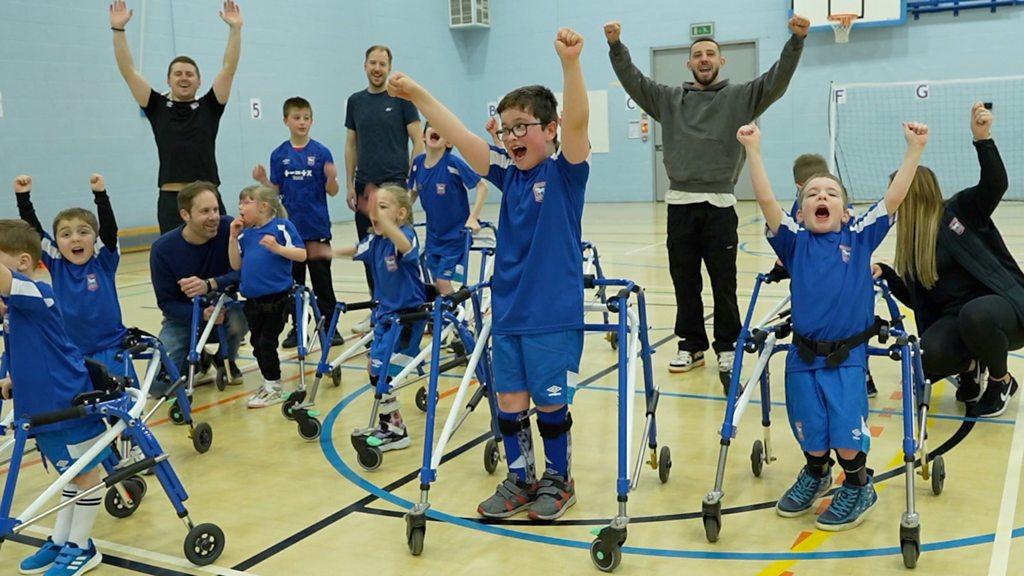Disabled football coach recalls 'upsetting' rejection as child
- Published
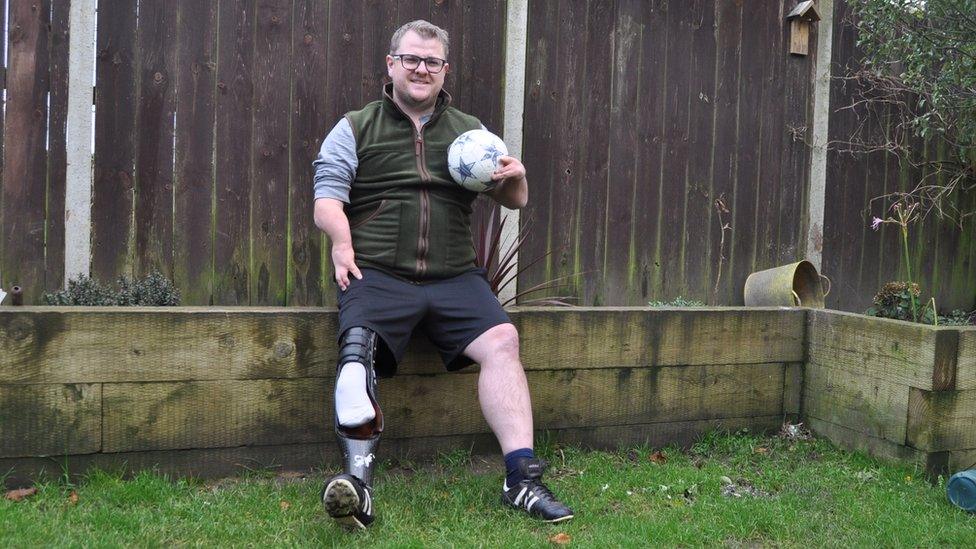
FFU syndrome means Sam Nunn has two shorter arms and a short right leg, which has a removeable prosthetic (his foot is in the white sock)
A junior football coach with arm and leg impairments says his own "upsetting" rejection as an 11-year-old has ultimately made him "stronger".
Sam Nunn, 39, coaches a junior team in Suffolk, but struggled to find a club who would take him on in the mid 1990s.
It took him two years to find a junior club, and later went on to play for Ipswich Town's disabled side and earn his FA level two coaching badges.
"Never give up... and don't let anyone bring you down," he said.
Mr Nunn, from Chelmondiston, near Ipswich, was born with femur, fibula and ulna (FFU) syndrome, which in his case resulted in shortened arms with three fingers on each hand, and a shortened right leg, which has a prosthetic to make it as long as his left leg, allowing him to walk and run.
Despite enjoying kickabouts and school team football, he found he was rejected by a local junior team.
"It's quite a memory, and not a particularly fond one, of my parents phoning up a local team asking if I could come training, but the chap at the time, who I'm not going to name, didn't want to accommodate me, which was difficult, really difficult," he said.
"I thought 'I'm never gonna be able to play football', and obviously it's tough. There were tears, absolutely."
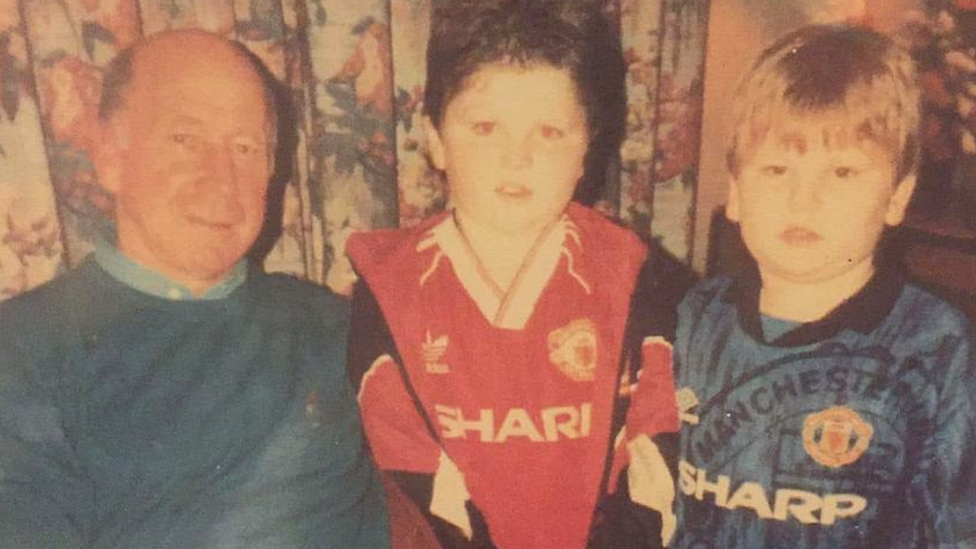
Manchester United fans Sam (centre, with his brother Jim) with United and England legend, the late Sir Bobby Charlton
His mum Pauline said: "The knockback was distressing and he was upset about it, as we were as parents.
"He still had his kickabouts in the village, but he wanted to play for a proper team.
"It took a couple of years to find that team, and then we were off."
Sam said: "You get setbacks and ultimately it's probably made me stronger in the long run, but it's something I do remember."
He found a berth with Somersham's junior team aged 13, and played with them before joining Wimbledon FC's disabled team at 17, and then on to Southend United's amputee team, before playing for the Ipswich Town disabled team, aged 19-28.
"It wasn't until I got to my late teens that I was able to explore and seriously look at playing disabled football, and Ipswich Town gave me the opportunity to start doing some coaching, which has then created opportunities with the coaching side, both disabled and able-bodied," he said.
"We should all be treated equally; but they should all be getting fair game time and being given those opportunities which I never got, unfortunately."
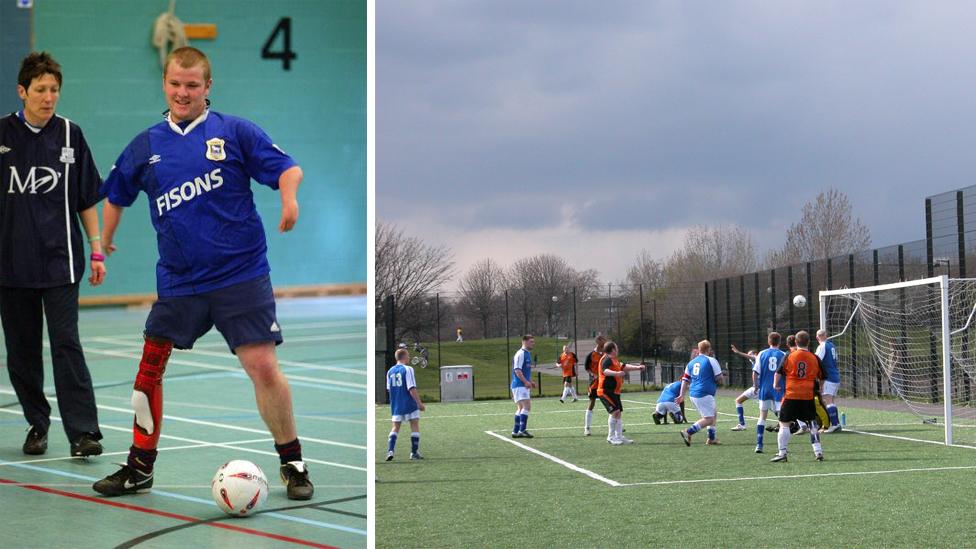
Sam Nunn played with the Ipswich Town disabled team for about a decade before he concentrated on his clay pigeon shooting
During his time at Ipswich he also became a coach with several non-league adult sides including Woolverstone, Shotley Rose, Ransomes Sports and Crane Sports before taking a break to focus on his shooting where he became the Clay Pigeon Shooting Association's disabled shooter of the year, and won two silver world championship medals.
Sam, who works as a procurement manager with a construction firm, currently coaches with the Holbrook Hornets, who are all able-bodied and include his two sons, one in the under-10s and one in the under-sevens. His daughter is still a toddler and yet to commit to football.
Some of the junior squad were not aware at first that Sam had limb difference.
Freddie, nine, said: "At first I didn't know he had disabilities, because he was moving around so well. He's really knowledgeable."
"Even though he is disabled, it just proves that you can do anything," said Matilda, nine.
Arlo, nine, said: "I wondered how he moved around, but he's been brilliant and helped me be a bit more aggressive and confident with the ball."
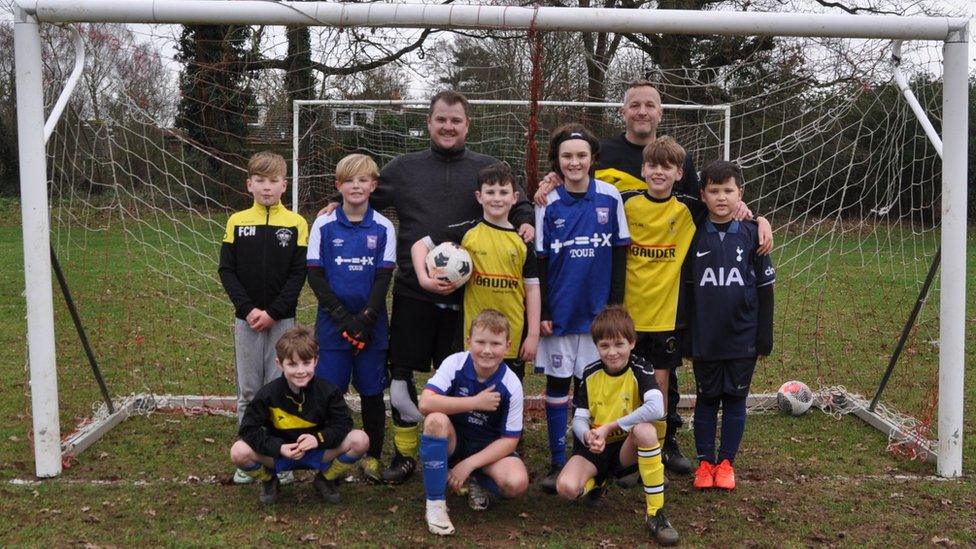
Sam with some of the Holbrook Hornets under-10s squad, including his two sons, and co-coach Dave Hastings
Holbrook co-coach Dave Coleman, who has known Sam since he was about two years old, says his friend can "show kids of all abilities what they can achieve".
"He's always impressed me how he has never let things get him down; he's always been determined," he said.

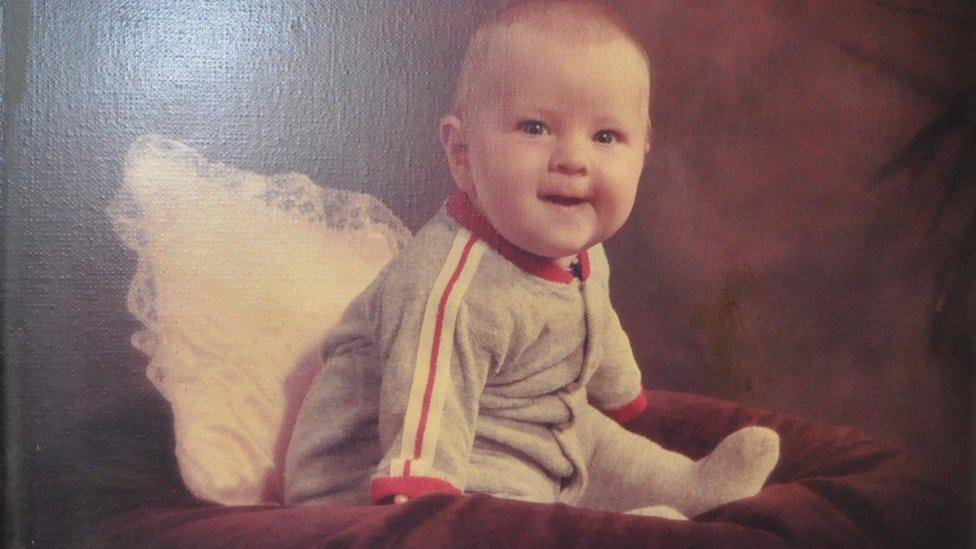
Sam Nunn as a baby - born with the non-genetic developmental condition that means he has limb impairments in both arms and his right leg
Femur, fibula and ulna syndrome
By Fergal Monsell, consultant orthopaedic surgeon, Bristol Royal Hospital for Children, external
FFU syndrome is a birth defect which affects the development of the femur in the thigh, the fibula in the calf and the ulna in the forearm. The extent of the abnormality is variable but the arm tends to be more severely affected.
It affects roughly 1 in 100,000 people and is more prevalent in males, although the reasons for this are unclear.
It is believed to be a developmental issue. The Human Genome Project has completed the mapping of our genes, and no evidence has been found that would lead to FFU syndrome being classed as an inherited condition, and it is therefore not passed from parents to their children.
While there is no way of preventing FFU as a baby develops or spotting the potential for the condition in parents before conception, advances in antenatal ultrasound may identify the condition during pregnancy.
People who have the syndrome can use the latest prosthetics, which have improved substantially in recent years. Surgery may also be an option to lengthen the leg and improve the function of the hand and arm.
People with the syndrome can expect to enjoy normal lives and participate in sport, often at a high level.
Mr Monsell is also honorary secretary of the British Orthopaedic Association.

Although the Ipswich Town disabled side was disbanded after Sam left, the relaunch of the Ipswich Town Community Trust, now the Ipswich Town Foundation, in 2019 saw the return of disability sessions, which currently includes adult PAN disability sessions, external, with teams competing in the Wots Up ICAN Football League, external. It also offers junior, frame football and wheelchair sessions.
Lee Smith, disability liaison officer at Ipswich Town FC, said: "I joined the club in 2018 and there was no provision whatsoever and we were able to put together some sessions.
"It's grown and it's back to where it should be with adults and youths at Portman Road. It's supported well by the club and its first-team players.
"The opportunity it provides has been life-changing for some of the participants, and that is something special and something to be proud of."
Sam says things have changed for the better for disabled youngsters since his childhood rejection.
"There's always a team for everyone these days, whatever their disability is, whatever the level is, but ultimately, try your best, never give up."
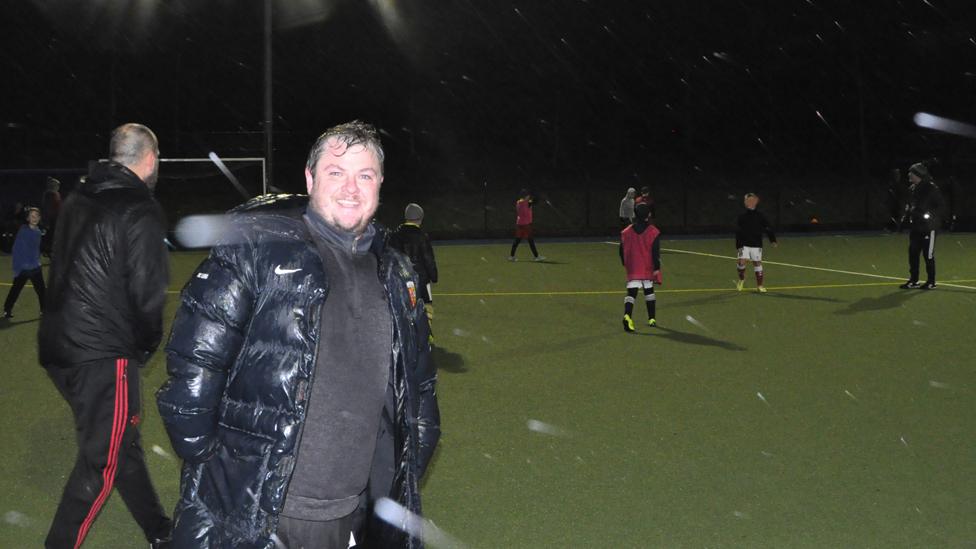
Sam Nunn coaching the Holbrook Hornets on a rainy December evening at the Royal Hospital School's artificial pitch

Follow East of England news on Facebook, external, Instagram, external and X, external. Got a story? Email eastofenglandnews@bbc.co.uk , externalor WhatsApp 0800 169 1830.
Related topics
- Attribution
- Published7 December 2023
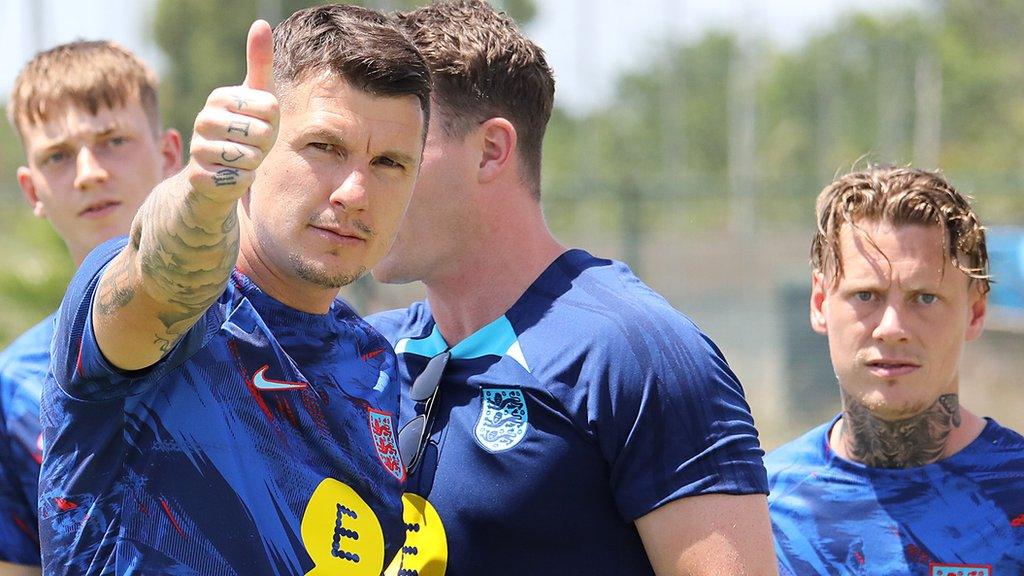
- Published5 December 2023
- Attribution
- Published9 November 2023
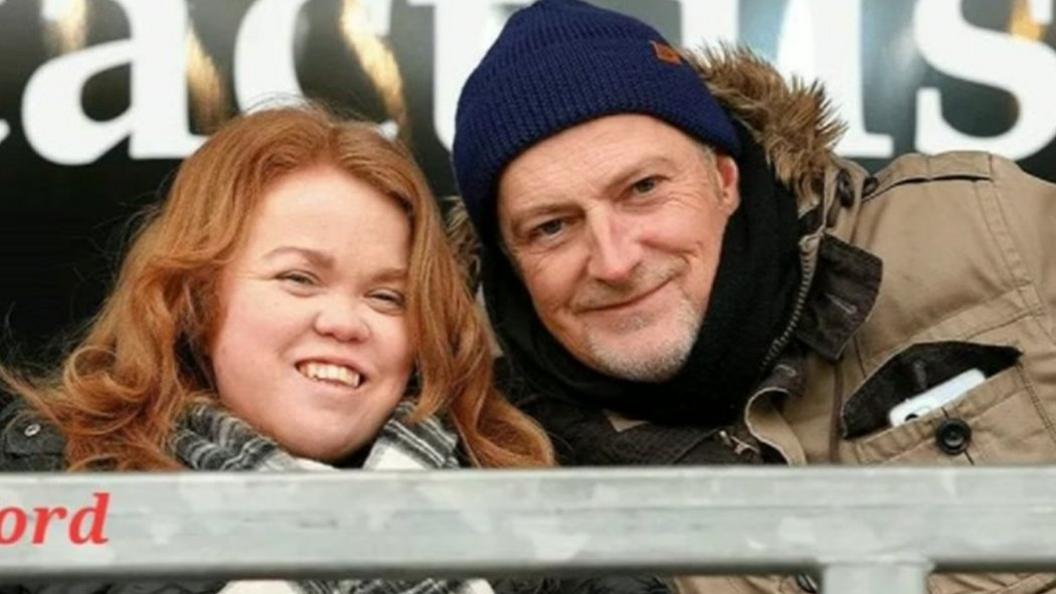
- Published22 August 2023
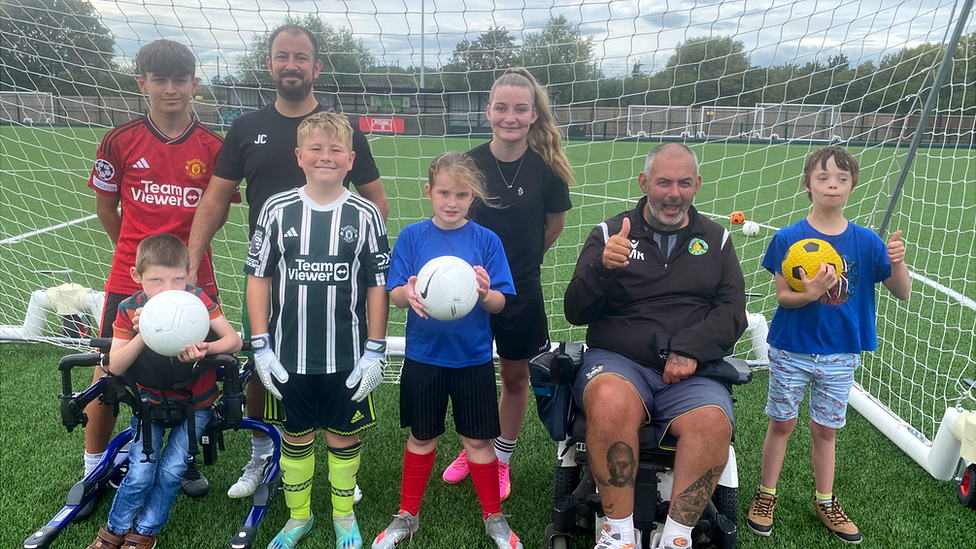
- Published4 April 2023
